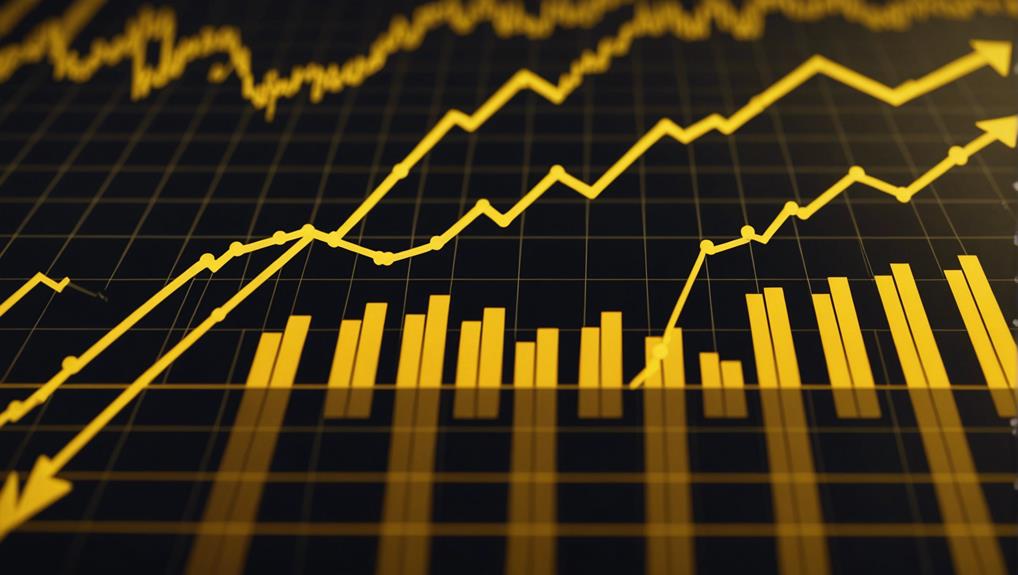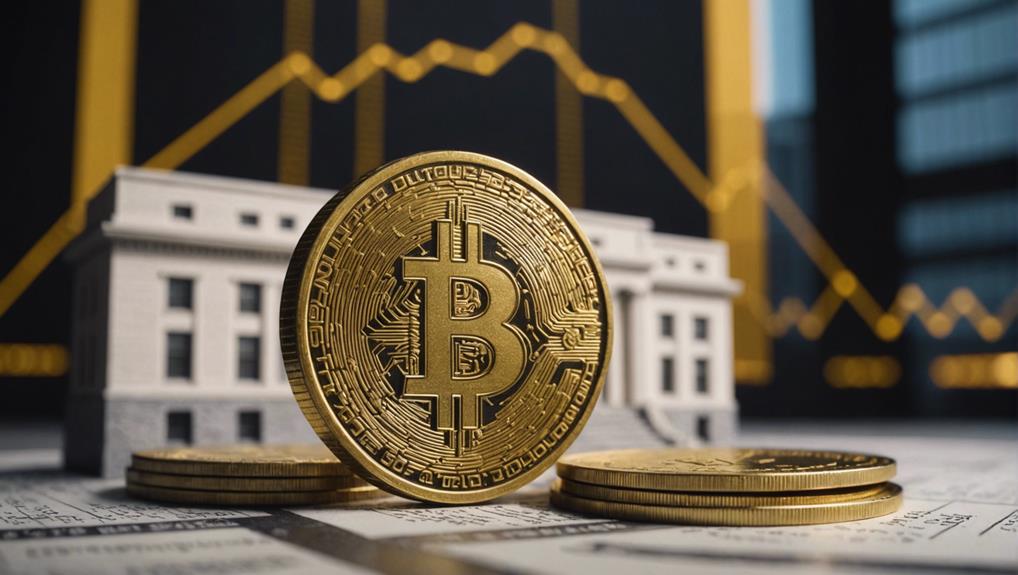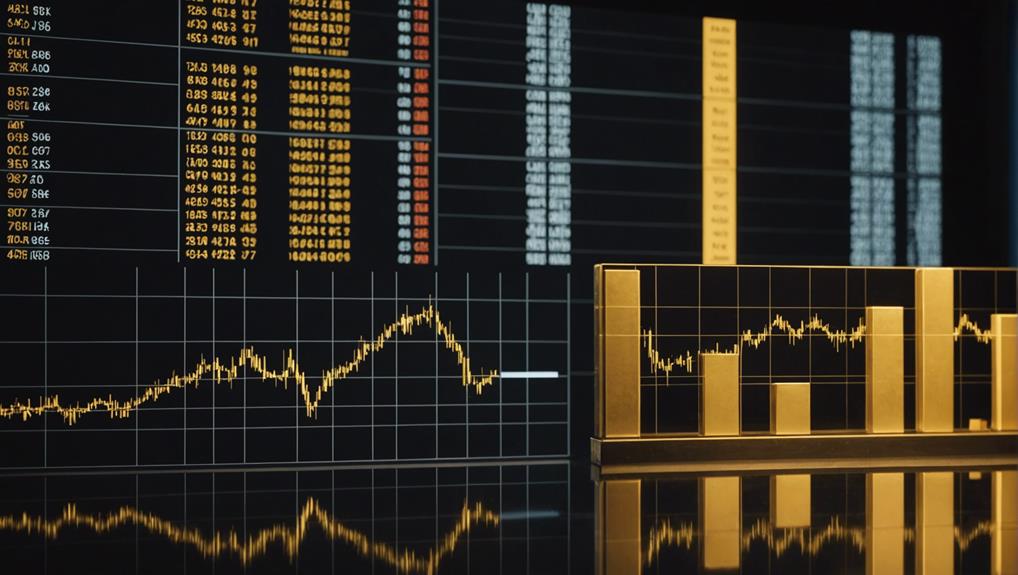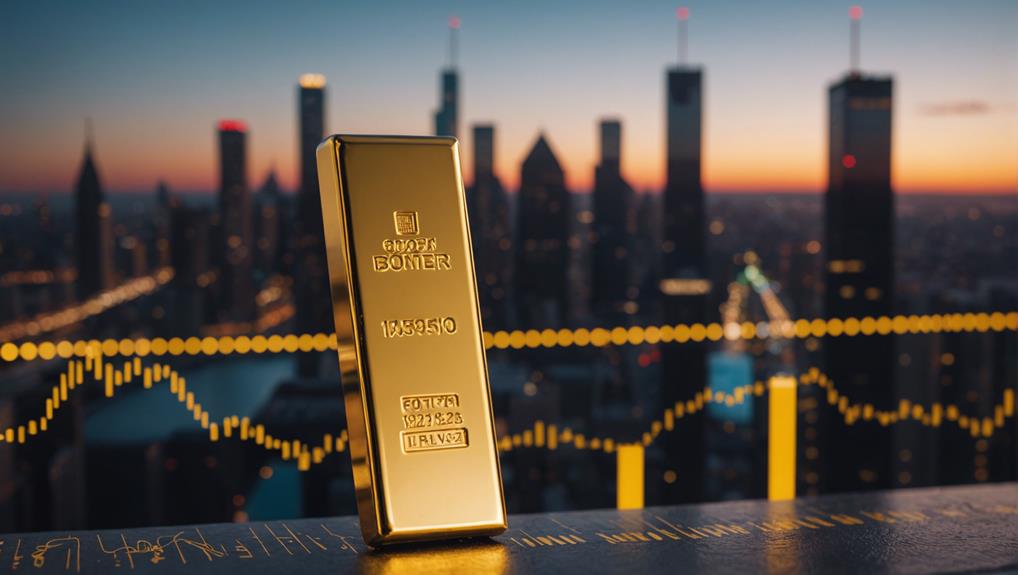Gold is historically perceived as a reliable hedge against inflation. That means when you invest in gold, it helps maintain your purchasing power even as general prices rise. This relationship stems from gold's scarcity and global confidence, making it a go-to asset in uncertain economic times. When inflation increases, often due to factors like rising production costs or excessive money supply, gold's value tends to rise as well. This is because gold can't be manufactured, thus its limited supply ensures it remains valuable. With inflation impacting the value of currency, turning to gold can be a secure approach to protect your investments. Understanding this correlation offers strategic advantages in managing your assets.
Historical Perspective on Gold

Throughout history, gold has consistently stood out as a reliable store of value during periods of economic instability. Investors often flock to gold when stock markets plunge or currencies falter, making it a symbol of wealth and security from ancient civilizations to modern times. Its inherent value comes from its rarity and the universal esteem it holds across cultures. Unlike paper currency, which governments can print at will, gold's supply is limited; no one can manufacture it. This scarcity, coupled with its enduring appeal, ensures that gold remains a coveted asset in tumultuous times, helping you preserve your wealth when other investments might be losing their shine.
What Drives Inflation?

Inflation occurs when the overall price levels of goods and services in an economy increase over a period, reducing your purchasing power. Understanding what drives inflation can help you manage its impacts better.
- Demand-Pull Inflation: When demand for goods and services exceeds supply, prices rise. You feel this when you're competing for scarce resources.
- Cost-Push Inflation: Increases in the cost of production, like wages and raw materials, can lead businesses to raise prices to maintain profits.
- Monetary Factors: Excessive money supply in the economy can diminish the value of currency, leading to price increases.
- Expectations of Inflation: If people expect prices to rise, they may spend more now, further accelerating inflation.
Gold as an Inflation Hedge

You might wonder how effectively gold can protect your investments against inflation.
Let's start by evaluating its historical performance in times of high inflation and compare it to other assets you might consider.
This analysis will help you understand whether gold is a reliable safeguard or if there are better options available.
Historical Performance Analysis
Gold has historically served as a reliable hedge against inflation, preserving purchasing power in times of currency devaluation. You've likely noticed how during economic downturns, investors flock to gold. Here's why this trend persists:
- Stability: Gold often maintains its value as fiat currencies weaken.
- Global Confidence: Nations and investors turn to gold in uncertain times, bolstering its demand.
- Scarcity: Limited supply ensures that gold remains a coveted asset.
- Historic Resilience: Over decades, gold has repeatedly outperformed other hedges during inflation spikes.
Understanding these factors can help you appreciate why gold is considered a safe haven. It's not merely about tradition; it's about tangible value retention when other investments falter.
Comparative Asset Review
While gold has a proven track record as an inflation hedge, it's helpful to compare its performance with other assets in similar economic conditions. You'll find that stocks, real estate, and bonds additionally vie for attention during inflationary times.
Stocks often benefit from economic growth that can coincide with inflation, but they're additionally prone to market volatility. Real estate generally appreciates, providing a tangible asset that adjusts with price levels. Nonetheless, it involves higher transaction costs and isn't as liquid as gold.
Bonds typically lose appeal as their fixed returns diminish in value with rising prices. Therefore, while gold isn't the only option, its ease of liquidity and historical stability make it a unique, reliable choice during inflationary periods.
Analyzing Gold Price Fluctuations

Numerous factors drive the volatility of gold prices in the market. As you investigate these elements, you'll better comprehend how to manage your investments in gold. Here are crucial drivers:
- Global Political Stability: When uncertainty rises, the attractiveness of gold as a safe haven also increases.
- Currency Fluctuations: Specifically, movements in the U.S. Dollar directly impact gold prices. A weaker dollar often leads to higher gold prices.
- Interest Rates: Lower interest rates reduce the opportunity cost of holding non-yielding assets like gold, increasing its appeal.
- Supply and Demand Dynamics: Changes in production or new discoveries can significantly influence prices.
Each factor intertwines, impacting your decision to buy or sell gold. Keep a close eye on these variables to make informed choices.
Economic Theories Explained

Understanding economic theories can greatly enhance your ability to make strategic investment decisions.
For instance, the Quantity Theory of Money suggests that an increase in money supply leads to higher inflation, which often elevates gold prices as investors seek a stable store of value.
Likewise, the Demand-Pull Inflation theory posits that when demand for goods exceeds supply, prices rise. This can impact gold as it becomes a hedge against rising prices.
You'll also come across Cost-Push Inflation, where increased production costs push up prices, once again making gold an attractive investment.
Comprehending these concepts helps you predict how changes in the economy might influence gold prices, assisting in better investment decisions without diving into complex monetary policies.
Impact of Monetary Policy

You'll find that monetary policy significantly influences gold prices, particularly through central bank rate decisions.
When banks implement quantitative easing, it often leads to changes in inflation expectations, which in turn affect gold.
Central Bank Rate Decisions
Central bank rate decisions significantly influence gold prices as they directly impact inflation and economic stability. When you're contemplating investing in gold, it's essential to keep an eye on these decisions. Here's why:
- Interest Rates Hike: Typically, higher rates increase the value of the currency, making gold less appealing.
- Lower Interest Rates: Conversely, lower rates decrease the currency's value, enhancing gold's attractiveness.
- Inflation Fears: If investors anticipate inflation, they might purchase more gold to safeguard their wealth.
- Economic Signals: Rate changes indicate economic health. Poor health might lead you to safer assets like gold.
Understanding these dynamics helps you make informed decisions, potentially safeguarding and growing your investments.
Quantitative Easing Effects
Quantitative easing often lowers interest rates, which can make gold more attractive as an investment. When central banks inject more money into the economy, you might see gold prices rise. This happens because investors often view gold as a hedge against potential inflation and currency devaluation. As more money circulates, the value of your currency could drop, enhancing gold's appeal.
Here's a quick look at how quantitative easing impacts different aspects:
| Aspect | Before QE | After QE |
|---|---|---|
| Money Supply | Lower | Increased |
| Investor Confidence | Varies | Often Improved |
| Currency Value | Stable | Potentially Depreciated |
| Gold Demand | Moderate | Increased |
| Economic Activity | Sluggish | Stimulated |
You'll notice these effects can influence your investment decisions, especially in gold.
Interest Rate Implications
Interest rates often fluctuate significantly due to changes in monetary policy, impacting your investment strategy and purchasing power. When central banks adjust rates, here's what typically happens:
- Your Savings Account: The interest you earn on savings can increase, enhancing your passive income.
- Your Mortgage Rates: If you're looking to buy a home, higher rates mean higher monthly payments.
- Your Credit Cards: Higher rates also mean higher interest on your credit card debt, costing you more over time.
- Your Investments: Bonds might drop in value, but higher interest rates can lead to better yields in the future.
Understanding these impacts helps you manage your finances more effectively in a fluctuating economic landscape.
Global Inflation Trends

Global inflation trends have significantly influenced your purchasing power over recent years. You've likely noticed changes in the cost of goods and services, and this table highlights the average inflation rates in various regions, explaining how widespread these effects are.
| Region | Average Inflation Rate (%) |
|---|---|
| North America | 3.5 |
| Europe | 2.8 |
| Asia | 4.1 |
| South America | 7.2 |
These figures illustrate the variability in inflation worldwide. If you're living in South America, you've experienced the highest inflation rates, which affect how much gold and other commodities you can afford. Understanding these trends helps you make informed decisions about protecting your investments against inflation.
Comparing Gold With Other Investments

Now let's compare how gold stacks up against other investment options in times of varying inflation rates. While gold is often lauded for its stability, other investments might react differently depending on economic conditions.
- Stocks: These can offer higher returns, but they're additionally more volatile. Emotional highs and lows often accompany the stock market's dramatic shifts.
- Bonds: Generally safer than stocks, bonds provide fixed returns. Nevertheless, during high inflation, their real value can diminish quickly.
- Real Estate: Property investments can hedge against inflation but require more capital and can be less liquid.
- Cryptocurrencies: Highly volatile and influenced by market sentiment, they're a speculative choice compared to gold's historical reliability.
Each option has its unique traits, making them more or less suitable depending on your financial goals and risk tolerance.
Future Predictions for Gold

As you look ahead, understanding the gold price forecast becomes important in assessing your investment strategies.
Evaluating the economic impact analysis will help you comprehend how shifts in the global economy influence gold prices.
This insight is vital for making informed decisions that align with future market trends.
Gold Price Forecast
Looking ahead, experts predict that gold prices may continue to rise due to persistent economic uncertainties. You might be wondering what this means for your investments or savings. Here are a few reasons why experts believe gold's value might soar:
- Increased Demand: As more people look for safe investment options, demand for gold could skyrocket.
- Inflation Concerns: With inflation rates climbing, gold becomes an attractive hedge, preserving purchasing power.
- Geopolitical Tensions: Ongoing global conflicts encourage investors to turn to more stable assets like gold.
- Dwindling Supplies: If gold mining decreases, lower supply could naturally push prices up.
Keep these factors in mind as you consider adjusting your financial strategy to potentially include gold.
Economic Impact Analysis
Taking into consideration the factors outlined above, you should expect gold's economic impact to increasingly influence global markets in the coming years. As inflation persists, you'll likely see more investors turning to gold as a hedge, enhancing its demand and potentially its price.
Central banks might additionally increase their gold reserves in anticipation of market volatility. This could further establish gold as a critical asset in global financial systems. Furthermore, geopolitical tensions and economic uncertainties tend to push the value of gold higher, making it a go-to asset during times of crisis.
You need to watch how these dynamics play out, as they could significantly affect your investment decisions and the broader economic landscape.
Strategies for Investing in Gold

Investing in gold can protect your portfolio against inflation and economic uncertainty. When you're contemplating diversifying with gold, here are four strategies that might resonate with you:
- Physical Gold: Buying coins or bullion can evoke a sense of security, knowing you hold a tangible asset.
- Gold ETFs: These funds track the price of gold and can be traded easily, offering you flexibility.
- Gold Mining Stocks: Investing in companies that mine gold lets you tap into potential profits from gold production.
- Gold Mutual Funds: These funds invest in a range of gold-related assets, providing diversification within this single sector.
Each option has its unique appeal, depending on your investment goals and risk tolerance.
Conclusion
To distill the essence of the discussion: gold, though a classic defense against inflation, doesn't always perform consistently. The value of gold is swayed by a mix of economic fluctuations, market sentiments, and global happenings. When pondering the inclusion of gold in your portfolio, remember that past successes aren't predictive of future outcomes. A well-rounded investment strategy is wise. It's crucial to remain updated and adjust your approaches to suit contemporary economic insights and market conditions, especially when navigating the tricky waters of gold investment.
However, let's face the hard truth. The traditional banking system, with its preferential treatment towards the affluent, often leaves the average investor in the lurch. This disillusionment with banks, coupled with a general distrust in the monetary system and political maneuvers, nudges us towards seeking more direct control over our financial destinies. Gold offers that tangible security, distancing us from the often opaque and self-serving financial institutions and political games.
Investing in gold isn't just about safeguarding wealth—it's a statement of taking control in an era where banks seem to have forgotten the everyday person. It's about not having to rely solely on systems and structures that have repeatedly shown themselves to be more in favor of the rich than the common investor.
Therefore, to truly empower yourself and get a deeper understanding of how gold can fortify your financial future against the unpredictable waves of economic policies and market shifts, requesting a free gold information kit today is a smart move. This kit isn't just a collection of pages; it's a gateway to mastering the reins of your financial health.
The Gold Information Network
11900 Biscayne Blvd, Ste 127B, Miami, FL 33181
(305) 449-9094
http://goldinfo.net
Dive into the world of gold, where control, security, and financial wisdom await.







